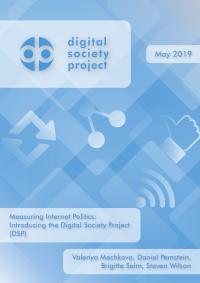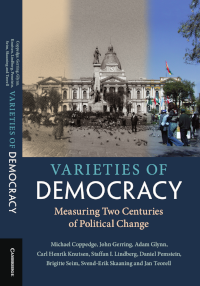Welcome
You've reached Dan Pemstein's website. I'm a professor of Political Science & Public Policy at North Dakota State University, where I co-direct the Center for the Study of Digital Society. I'm a comparative political economist and methodologist who studies democratic institutions. Much of my current research examines challenges that digital networks pose to democracy and develops tools to better measure democratic institutions. I also have an ongoing research program that explores the interplay between legislative behavior, political careers, and party organization and have burgeoning interests in the political economy of development and criminal justice policy. I teach courses on comparative politics, political economy, global public policy, and research methods. I serve as an associate editor for the American Political Science Review.
I am involved in a number of data and software projects. In particular, I am the co-director of the Digital Society Project, a co-developer of the Unified Democracy Scores, and a co-author of the Scythe Statistical Library. I also serve as project manager for measurement methods for, and sit on the steering committee of, the Varieties of Democracy project.
A variety of funders have supported my research, including the National Science Foundation, the International Growth Centre, Centre of Excellence for Development Impact and Learning, NORC at the University of Chicago's USAID-supported Democracy, Human Rights, and Governance program, Facebook, Google, Twitter, the European Union Center at the University of Illinois, and—through sub-contracts from the University of Gothenburg—the Riksbankens Jubileumsfond and Knut and Alice Wallenberg Foundation.
Research
You can find publications, working papers, and data related to my research on digital politics and policy, candidates, parties, and legislative behavior, measuring democratic institutions, political economy of development, and assorted other topics below. Take a look at my CV, google scholar profile, or dataverse for more information.
Selected Recent Publications
-
Vote Buying and Local Public Goods Provision: Substitutes or Complements? (AJPS)
-
Measuring Online Political Activity: Introducing the Digital Society Project (JITP)
-
Conceptual and Measurement Issues in Assessing Democratic Backsliding (PS)
Digital Politics and Policy
-
Measuring Online Political Activity: Introducing the Digital Society Project
(with Valeriya Mechkova, Brigitte Seim, and Steven Wilson)
(2025) Journal of Information Technology & Politics 22(3): 279-295.
-
(with Valeriya Mechkova, Brigitte Seim, and Steven Wilson)
The DSP surveys country experts to produce cross-national, time-varying, indicators of the prevalence of misinformation campaigns and coordinated information operations on social media, multiple dimensions of digital media freedom, state internet regulatory capacity and approach, and online media polarization and politicization. DSP builds on the Varieties of Democracy Project's approach, surveying V-Dem experts and leveraging the suite of methodological tools that we developed for V-Dem. Read Measuring Internet Politics: Introducing the Digital Society Project for details.
-
Do Sanctioning and Monitoring Affect Political Elites' Online Toxicity? Evidence from a Field Experiment on US General Election Candidates
(with Yunus Emre Orhan, Valeriya Mechkova, Brigitte Seim, and Steven Wilson)
-
Terrorism and Internet Censorship
(with Stephen Meserve)
(2020) Journal of Peace Research 57(6): 752-763
-
Google Politics: The Political Determinants of Internet Censorship in Democracies
(with Stephen Meserve)
(2018) Political Science Research and Methods 6(2): 245-263
-
What You See is What You Get: Webcam Placement Influences Perception and Social Coordination
(with Laura Thomas)
(2015) Frontiers in Psychology (Cognition) 6(306)
Candidates, Parties, Careers, and Legislative Behavior
-
Did Rosie the Riveter Send Ms. Smith to Washington?
-
Vote Buying and Local Public Goods Provision: Substitutes or Complements?
(with Jeevan Baniya, Stephen Meserve, and Brigitte Seim)
(Forthcoming) American Journal of Political Science
[Ungated] [Preprint] [Replication Data] [Appendices]
-
Understanding Vote Buying in Nepali Elections
(with Jeevan Baniya, Stephen Meserve, and Brigitte Seim)
(2024) Electoral Studies 88: 102766.
-
Gender, Incumbency, and Party List Nominations
(with Stephen Meserve and William Bernhard)
(2020) British Journal of Political Science 50(1): 1-15
-
Who Rules the World? A Comprehensive Assessment of Political Leaders
(with John Gerring, Erzen Oncel, and Kevin Morrison)
(2019) Perspectives on Politics 17(4): 1079-1097
-
Measuring Candidate Selection Mechanisms in European Elections: Comparing Formal Party Rules to Candidate Survey Responses
(with Stephen Meserve and Sivagaminathan Palani)
(2018) European Union Politics 19(1): 185-202
-
Brussels Bound: Policy Experience and Candidate Selection in European Elections
(with Stephen Meserve and William Bernhard)
(2015) Comparative Political Studies 48(11): 1421-1453
-
Political Ambition and Legislative Behavior in the European Parliament
(with Stephen Meserve and William Bernhard)
(2009) Journal of Politics 71(3): 1015-1032
-
The Power of Suggestion: Coordinating Compromise in a Bicameral Legislature
Measuring Democratic Institutions (V-Dem, UDS, and Related Methods)
-
Apples to Oranges: Using Surveys to Measure Concepts Across Cases
(with Kyle Marquardt and Brigitte Seim)
(Under Contract) Cambridge University Press (Strategies for Social Inquiry Series)
-
Experts, Coders, and Crowds: An Analysis of Substitutability
(with Kyle Marquardt, Constanza Sanhueza Petrarca, Brigitte Seim, Steven Wilson, Michael Bernhard, Michael Coppedge, and Staffan Lindberg)
(Forthcoming) International Political Science Review
-
Measuring Electoral Democracy with Observables
(with Daniel Weitzel, John Gerring, and Svend-Erik Skaaning)
(Forthcoming) American Journal of Political Science
[Ungated] [Preprint] [Replication Data] [Appendices]
-
Conceptual and Measurement Issues in Assessing Democratic Backsliding
(with Carl Henrik Knutsen, Kyle Marquardt, Brigitte Seim, Michael Coppedge, Amanda Edgell, Juraj Medzihorsky, Jan Teorell, John Gerring, and Staffan Lindberg)
(2024) PS: Political Science & Politics 57(2): 162-177
-
Measuring Backsliding with Observables: Observable-to-Subjective Score Mapping (OSM)
(with Daniel Weitzel, John Gerring, and Svend-Erik Skaaning)
(2024) PS: Political Science & Politics 57(2): 216-223
-
Estimating Latent Traits from Expert Surveys: An Analysis of Sensitivity to Data Generating Process
(with Kyle Marquardt)
(2023) Political Science Research & Methods 11(2): 384-393
-
Assessing Data Quality: An Approach and an Application
(with Kelly McMann, Brigitte Seim, Jan Teorell, and Staffan Lindberg)
(2022) Political Analysis 30(3): 426-449
[Ungated] [Working Paper Version] [Code Ocean Capsule] [Replication Package]
-
An Ordinal, Concept-driven Approach to Measurement:The Lexical Scale
(with John Gerring and Svend-Erik Skaaning)
(2021) Sociological Methods & Research 50(2): 778-811
[Ungated]
-
Varieties of Democracy: Measuring Two Centuries of Political Change
(with Michael Coppedge, John Gerring, Adam Glynn, Carl Henrik Knutsen, Staffan Lindberg, Brigitte Seim, Svend-Erik Skaaning, and Jan Teorell)
(2020) Cambridge University Press
[Buy]
Reviews: Canadian Journal of Political Science, Democratization, Perspectives on Politics
-
What Makes Experts Reliable? Expert Reliability and the Estimation of Latent Traits
(with Kyle Marquardt, Brigitte Seim, and Yi-ting Wang)
(2019) Research and Politics
-
Introducing the Historical Varieties of Democracy Dataset: Political Institutions in the Long 19th Century
(with Carl Henrik Knutsen, Jan Teorell, Agnes Cornell, John Gerring, Haakon Gjerløw, Svend-Erik Skaaning, Tore Wig, Dan Ziblatt, Kyle Marquardt, and Brigitte Seim)
(2019) Journal of Peace Research 56(3): 440-451
-
IRT Models for Expert-Coded Panel Data
(with Kyle Marquardt)
(2018) Political Analysis 26(4): 431--456
-
V-Dem: A New Way to Measure Democracy
(with Staffan Lindberg, Michael Coppedge, John Gerring, Jan Teorell, David Altman, Michael Bernhard, Steven Fish, Adam Glynn, Alan Hicken, Matthew Kroenig, Kelly McMann, Pamela Paxton, Megan Reif, Svend-Erik Skaaning, Jeffrey Staton, Eitan Tzelgov, and Yi-ting Wang)
(2014) Journal of Democracy 25(3): 159-169
-
Democratic Compromise: A Latent Variable Analysis of Ten Measures of Regime Type
(with James Melton and Stephen Meserve)
(2010) Political Analysis 18(4): 426-449
[UDS Data] [UDS Tutorial] [Replication Package] [Marquez' Extended UDS]
-
(with Kyle Marquardt, Eitan Tzelgov, Yi-ting Wang, and Farhad Miri)
-
Evaluating and Improving Item Response Theory Models for Cross-National Expert Surveys
(with Eitan Tzelgov and Yi-ting Wang)
-
(with James Melton and Stephen Meserve)
A set of measures that leverage the efforts of a variety of experts to provide a composite scale of democracy, accompanied by estimates of measurement uncertainty. The scores are available for virtually every country in the world from 1946 through 2012.
-
Varieties of Democracy (V-Dem)
(with a lot of people)
V-Dem is a collaborative project, involving around 3,000 social scientists and policy practitioners worldwide, that seeks to measure hundreds of the regime characteristics that underpin democratic government, both cross-nationally and over time. The comparative politics section of the American Political Science Association selected V-Dem for the 2015 Lijphart/Przeworski/Verba Data Set Award.
Political Economy of Development
-
Democracy Promotion and Electoral Quality: A Disaggregated Study
(with Carie Steele and Stephen Meserve)
(2021) Governance 34(2): 505-521.
-
Exploring scalable, efficient innovations to improve tax compliance among MSMEs
(with Brigitte Seim and Twivwe Siwale)
(2018) IGC Working Paper S-41429-ZMB-1
Everything Else
-
Proposal: A Political Science Peer Review and Publication Consortium
(with John Gerring)
(2021) PS: Political Science & Politics 54(1): 126-130
-
The Scythe Statistical Library: An Open Source C++ Library for Statistical Computation
(with Kevin Quinn and Andrew Martin)
(2011) Journal of Statistical Software 42(12)
Teaching
Recent and Upcoming Courses
Workshops
-
Varieties of Democracy Data: Incorporating Measurement Error
(with Michael Coppedge and Fernando Bizzarro Neto)
Computing
-
The Scythe Statistical Library
A C++ library for statistical computation co-authored with Kevin M. Quinn (Emory University) and Andrew D. Martin (Washington University). Scythe includes a suite of matrix manipulation functions, a suite of pseudo-random number generators, and a suite of numerical optimization routines. Scythe sits under the hood of a number of R packages, most notably MCMCpack, and has been used in published work in fields ranging from political science to computational statistics, dentistry, finance, molecular ecology, physics, and volcanology. Scythe is free software.
-
Here's my public key in case you want to send me an encrypted file or verify my digital signature. You can also find it on various keyservers. The fingerprint is 4E93 1DF1 3616 CC4E 9502 3DF6 22DC 44AA 132A 20B8.


